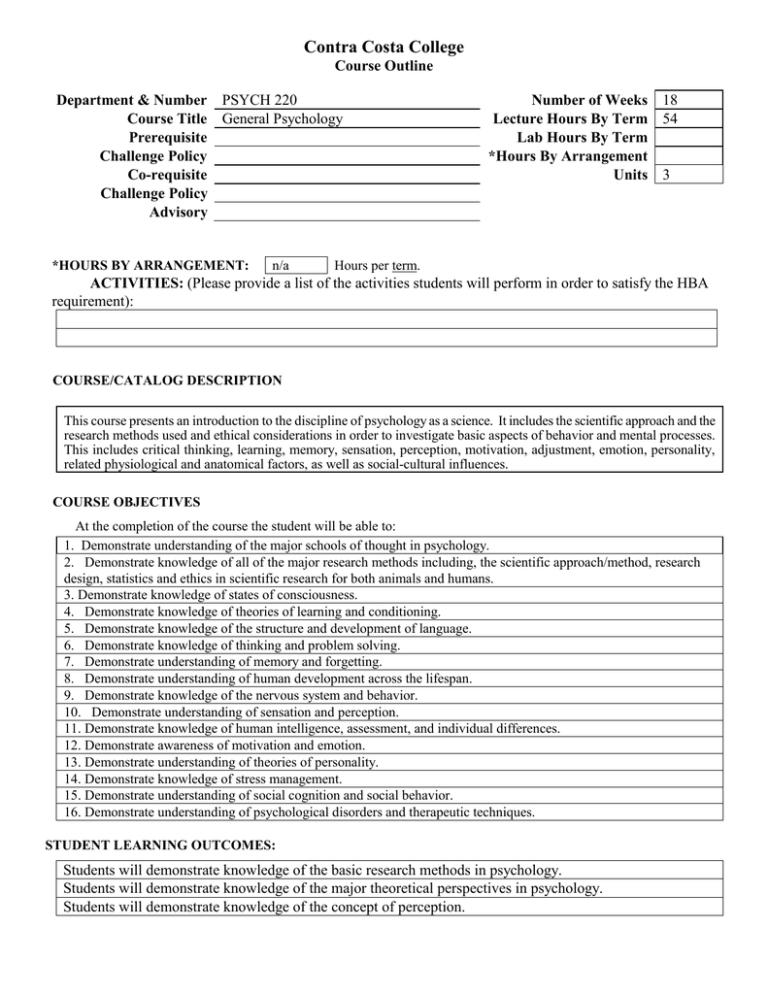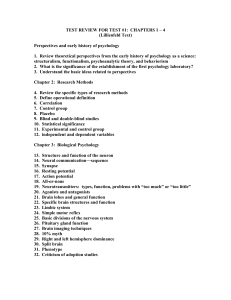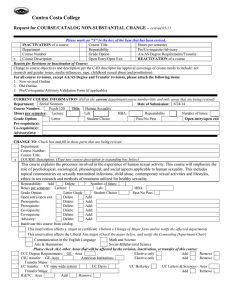PSYCH 220-S14.doc 73KB Oct 29 2014 10:10:09 AM
advertisement

Contra Costa College Course Outline Department & Number PSYCH 220 Course Title General Psychology Prerequisite Challenge Policy Co-requisite Challenge Policy Advisory *HOURS BY ARRANGEMENT: n/a Number of Weeks 18 Lecture Hours By Term 54 Lab Hours By Term *Hours By Arrangement Units 3 Hours per term. ACTIVITIES: (Please provide a list of the activities students will perform in order to satisfy the HBA requirement): COURSE/CATALOG DESCRIPTION This course presents an introduction to the discipline of psychology as a science. It includes the scientific approach and the research methods used and ethical considerations in order to investigate basic aspects of behavior and mental processes. This includes critical thinking, learning, memory, sensation, perception, motivation, adjustment, emotion, personality, related physiological and anatomical factors, as well as social-cultural influences. COURSE OBJECTIVES At the completion of the course the student will be able to: 1. Demonstrate understanding of the major schools of thought in psychology. 2. Demonstrate knowledge of all of the major research methods including, the scientific approach/method, research design, statistics and ethics in scientific research for both animals and humans. 3. Demonstrate knowledge of states of consciousness. 4. Demonstrate knowledge of theories of learning and conditioning. 5. Demonstrate knowledge of the structure and development of language. 6. Demonstrate knowledge of thinking and problem solving. 7. Demonstrate understanding of memory and forgetting. 8. Demonstrate understanding of human development across the lifespan. 9. Demonstrate knowledge of the nervous system and behavior. 10. Demonstrate understanding of sensation and perception. 11. Demonstrate knowledge of human intelligence, assessment, and individual differences. 12. Demonstrate awareness of motivation and emotion. 13. Demonstrate understanding of theories of personality. 14. Demonstrate knowledge of stress management. 15. Demonstrate understanding of social cognition and social behavior. 16. Demonstrate understanding of psychological disorders and therapeutic techniques. STUDENT LEARNING OUTCOMES: Students will demonstrate knowledge of the basic research methods in psychology. Students will demonstrate knowledge of the major theoretical perspectives in psychology. Students will demonstrate knowledge of the concept of perception. COURSE CONTENT (Lecture): Background—psychology as a science, history, schools of thought, research methods, the scientific method and ethics in scientific research with animals and humans. States of consciousness: sleep and dreaming, hypnosis, and psychoactive drugs. Adaptive behavior: classical conditioning, operant conditioning, and observational learning. Language and cognition: learning, thinking, and problem solving. Memory and forgetting: processing, meaningfulness, and organization. Developmental psychology: biological, motor, intellectual, social change, and life stages. Physiology and perception: nervous system, sensation, and perception. Motivation and emotion: drives, feelings, and motives. Personality: theories. Personality assessment and individual differences: instruments, methods, and evaluation. Stress management: sources, consequences, and coping. Social psychology: social perception and social influence. Pathology and treatment: scope, disorders, and therapy. COURSE CONTENT (Lab): METHODS OF INSTRUCTION Lecture and discussion (e.g., large groups and small groups) Multimedia (D2L) Online course elements including but not limited to course management software (Wiley Plus) Videos and films, quizzes Required readings INSTRUCTIONAL MATERIALS: NOTE: To be UC/CSU transferable, the text must be dated within the last 7 years OR a statement of justification for a text beyond the last 7 years must be included. Textbook Title: Author: Publisher: Edition/Date: Textbook Reading Level: Justification Statement: Psychology in Action Huffman Wiley Publishing 2012 College Level N/A OUTSIDE OF CLASS WEEKLY ASSIGNMENTS: Title 5, section 55002.5 establishes that a range of 48 -54hours of lecture, study, or lab work is required for one unit of credit. For each hour of lecture, students should be required to spend an additional two hours of study outside of class to earn one unit of credit. State mandates that sample assignments must be included on the Course Outline of Record. Outside of Class Weekly Assignments Hours per week Weekly Reading Assignments (Include detailed assignment below, if applicable) 2 Assigned reading every week covering pertinent materials related to critical thinking in psychology Weekly Writing Assignments (Include detailed assignment below, if applicable) 2 Journal Article review on Primary Psychological Source or Scientific Study that has been conducted within the past few years. See attached for assignment. Weekly Math Problems (Include detailed assignment below, if applicable) Lab or Software Application Assignments (Include detailed assignment below, if applicable) Other Performance Assignments (Include detailed assignment below, if applicable) 2 Wiley Plus assignments and videos and video quizzes and lectures on additional material related to the course objectives and SLO’s STUDENT EVALUATION: (Show percentage breakdown for evaluation instruments) 33 33 34 % % % % Midterm Final exam Journal Article Review/ Quizzes/ Wiley Plus Assignments GRADING POLICY (Choose LG, P/NP, or SC) x Letter Grade Pass / No Pass 90% - 100% = A 80% - 89% = B 70% - 79% = C 60% - 69% = D Below 60% = F 70% and above = Pass Below 70% = No Pass Prepared by: Michel Arnold, MS Date: 3/19/14 Revised 10/13 Student Choice 90% - 100% = A 80% - 89% = B 70% - 79% = C 60% - 69% = D Below 60% = F or 70% and above = Pass Below 70% = No Pass



